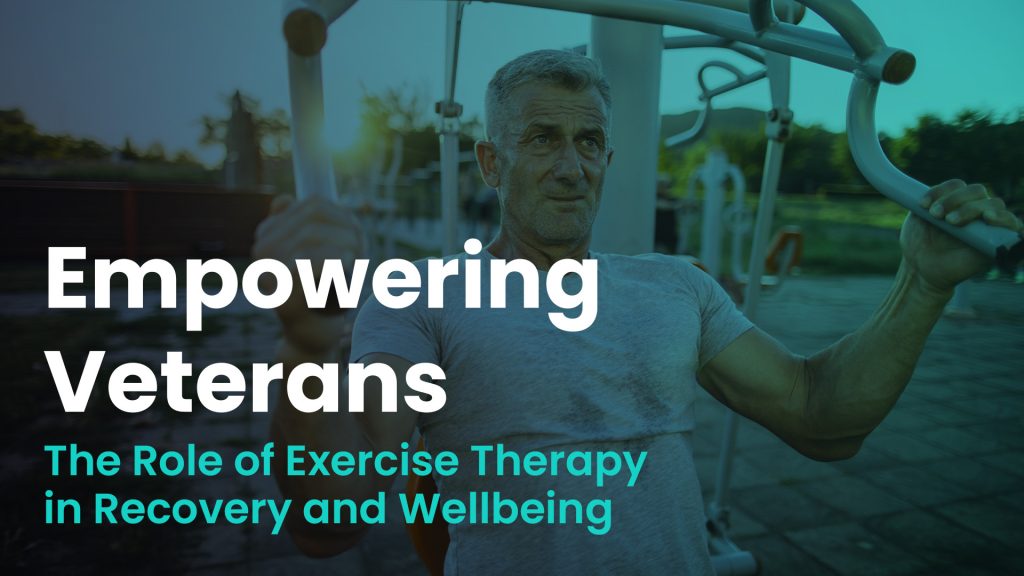
For many veterans, the transition to civilian life brings unique physical and mental health challenges. From managing PTSD to recovering from physical injuries, veterans often face a complex mix of health issues. Exercise therapy offers a powerful, evidence-based approach to improving both physical and mental wellbeing. In this blog, we explore how exercise therapy can support veterans on their journey to recovery, enhance their quality of life, and foster a sense of empowerment.
For more help and related resources, Phoenix Australia offers a wealth of support for a wide range of conditions.
Unique Health Challenges Faced by Veterans
Veterans often experience a range of health challenges that require targeted interventions:
- Post-Traumatic Stress Disorder (PTSD): A common issue among veterans, PTSD can cause anxiety, depression, and severe emotional distress.
- Chronic Pain and Injuries: Many veterans live with chronic pain from injuries sustained during service, such as back pain, joint problems, and muscle injuries.
- Mental Health Issues: Beyond PTSD, veterans may also struggle with anxiety, depression, and other mental health disorders.
- Mobility and Functional Limitations: Physical injuries can limit mobility, making it challenging for veterans to engage in daily activities or work.
How Exercise Therapy Can Help Veterans
Exercise therapy provides a holistic approach to managing these challenges:
- Reducing PTSD Symptoms: Research shows that regular physical activity can significantly reduce PTSD symptoms by boosting mood, reducing anxiety, and promoting better sleep.
- Managing Chronic Pain: Exercise helps alleviate chronic pain by strengthening muscles, improving joint mobility, and enhancing overall physical function.
- Improving Physical Health: Regular exercise helps improve cardiovascular health, increase strength and endurance, and maintain a healthy weight.
- Enhancing Mental Wellbeing: Physical activity stimulates the release of endorphins, the body’s natural mood lifters, and can provide a sense of purpose and routine.
For more information about our DVA services, click here.
Evidence-Based Approaches to Exercise Therapy for Veterans
Different forms of exercise can be particularly beneficial for veterans:
- Aerobic Exercise: Activities such as walking, running, or cycling improve cardiovascular health and can reduce symptoms of anxiety and depression.
- Strength Training: Building muscle strength helps prevent injury and supports recovery from physical injuries.
- Yoga and Mindfulness Exercises: These activities combine physical movement with mental relaxation techniques, helping reduce stress and improve flexibility.
- Group Fitness Classes: Participating in group classes provides social support and helps build a sense of community among veterans.
Success Stories: Veterans Benefiting from Exercise Therapy
Consider Mark, a veteran who struggled with PTSD and chronic pain after his service. Through a combination of aerobic exercise, strength training, and yoga, Mark found relief from his symptoms and regained a sense of control over his life. Similarly, Lisa, a veteran dealing with depression and anxiety, credits her regular exercise routine with helping her manage her mental health more effectively and reconnect with her community.
Getting Started with Exercise Therapy for Veterans
Starting an exercise therapy program can be a transformative experience for veterans. Here’s how to begin:
- Consult with a Healthcare Provider: Before starting any exercise program, it’s essential to consult with a healthcare professional, especially if there are existing health conditions.
- Set Realistic Goals: Work with an exercise physiologist to set achievable goals that align with personal health needs and preferences.
- Begin with a Personalised Plan: A tailored exercise program can address specific health concerns, such as PTSD or chronic pain, ensuring safety and effectiveness.
- Stay Consistent and Seek Support: Regularly attend sessions and seek support from fellow veterans or veteran support groups.
Exercise therapy is a valuable tool for veterans seeking to improve their physical and mental health. Whether managing PTSD, chronic pain, or other health challenges, personalised exercise programs can empower veterans to lead healthier, more fulfilling lives.
Are you a veteran looking to improve your health and wellbeing through exercise? Contact us today to learn more about our tailored exercise therapy programs designed specifically for veterans. Take the first step towards a healthier future!
